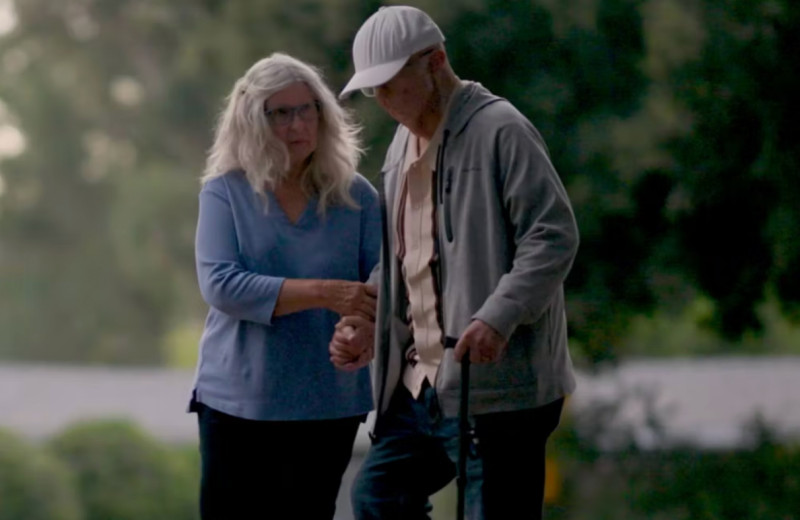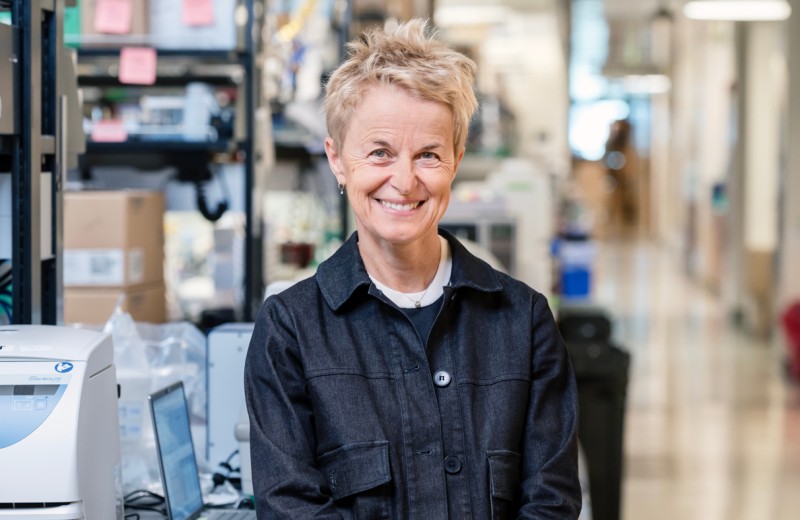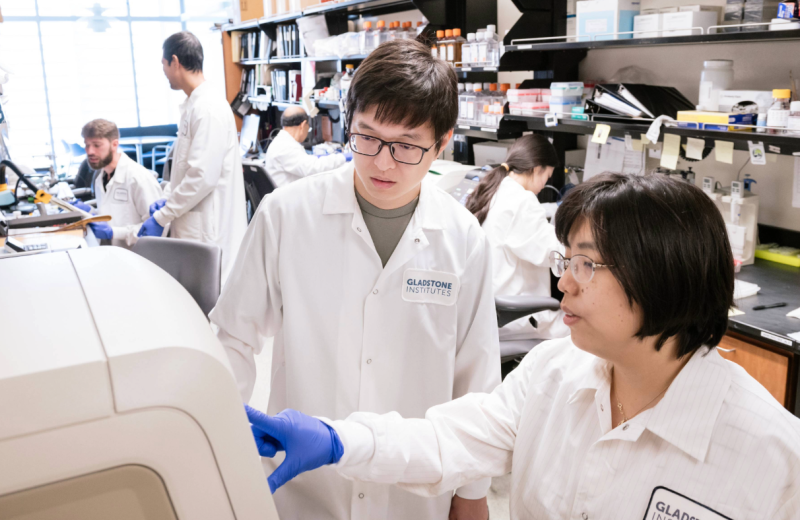Gladstone NOW: The Campaign Join Us on the Journey✕
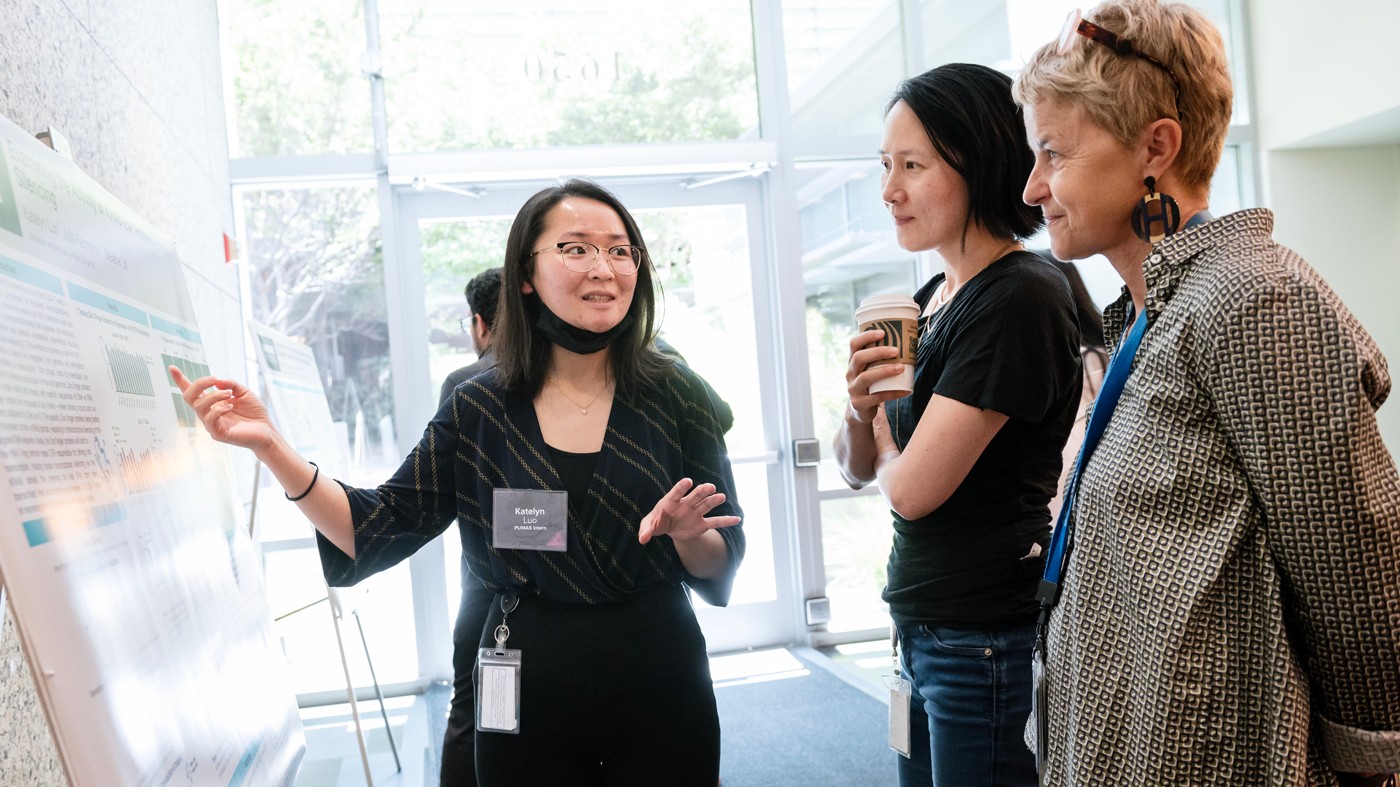
PUMAS intern Katelyn Luo explains her research project to Gladstone investigators Nadia Roan, PhD, and Melanie Ott, MD, PhD.
Desmond Richmond-Buccola grew up in a middle-class, predominately white community about 25 miles from San Francisco. He knew he had talent but lacked direction and mentorship. He didn’t have any Black role models and imposter syndrome threatened to stifle his potential.
Today, he’s leveraged his aptitude into two degrees from UC Berkeley (a BS in microbial biology and a BA in public health) and a recent PhD in virology from Harvard Medical School. He gives credit to the PUMAS (Promoting Underrepresented and Marginalized Populations’ Advancement in the Sciences) summer internship program at Gladstone Institutes for providing his initial boost.
“My fascination for science was first sparked with the HIV research I conducted that summer in Dr. Eric Verdin’s lab at Gladstone,” recalls Richmond-Buccola. “Being a queer Black man, I felt deeply connected to my community, which is disproportionately burdened by HIV and other infectious diseases, and my work felt immediately tangible.”
The PUMAS program was co-founded just over a decade ago by Gladstone Senior Investigator Melanie Ott, MD, PhD, and Kathy Ivey, PhD. Each summer, the program opens the laboratory doors at Gladstone to select community college students who might not otherwise find a path into a top-tier research institute. Funded since its inception by the National Heart, Lung, and Blood Institute, the program recently received a five-year grant renewal to drive its continued progress in building diversity within scientific ranks and launching careers in the STEM (science, technology, engineering, and mathematics) fields.
The funding supports a nine-week-long paid internship, as well as an allowance for eligible interns who need help with housing, travel or remote work. Emphasis is placed on identifying applicants who are historically underrepresented in biomedical research. The program’s remarkable accomplishments are revealed in the data: In a survey of PUMAS alumni spanning 2018-2022, 100 percent of the respondents had graduated from, were currently attending, or were transferring to a four-year institution with the intention of pursuing a STEM-related career.
Numbers such as these result from the proven strategy and year-round efforts implemented by Sudha Krishnamurthy, PhD, and her team. At Gladstone, Krishnamurthy is director of the Postdoctoral and Graduate Student Education and Research Development Affairs departments and co-PI (principal investigator) of the PUMAS grant, along with Ott.
“We begin by focusing our outreach efforts on local community colleges with strong STEM programs,” explains Krishnamurthy. “We give presentations, host booths at science festivals, and invite students to apply to the program. Sometimes PUMAS alumni join us to talk about their own experiences.”
Then, each January, she and her team canvas Gladstone PIs to inquire who might want to mentor an aspiring scientist over the summer. To date, Krishnamurthy reports, nearly every PI at Gladstone has welcomed one or more PUMAS interns into their labs.
Once the top 12-14 applicants are accepted (the number depends on the availability of additional funds), she thoughtfully matches the research interests of each student to a PI, as well as to a mentor within that PI’s lab. Being paired with a personal mentor, a guide through unfamiliar—and sometimes daunting—territory, has been crucial for helping the PUMAS interns achieve their goals.
“My PUMAS mentor was exceptional,” recalls Richmond-Buccola. “She met me where I was and spent ample time training me in the techniques needed for the project I was working on. But she never coddled me. Once I was technically proficient, she empowered me to plan my own schedule and manage my own experiments. This made me feel like a ‘real’ scientist and instilled a lot of confidence in me.”
The benefits of mentorship go both ways, acknowledges Krishnamurthy. While the interns can rely on a dedicated guide through their nine-week experience, mentors develop valuable leadership experience that furthers their own careers.
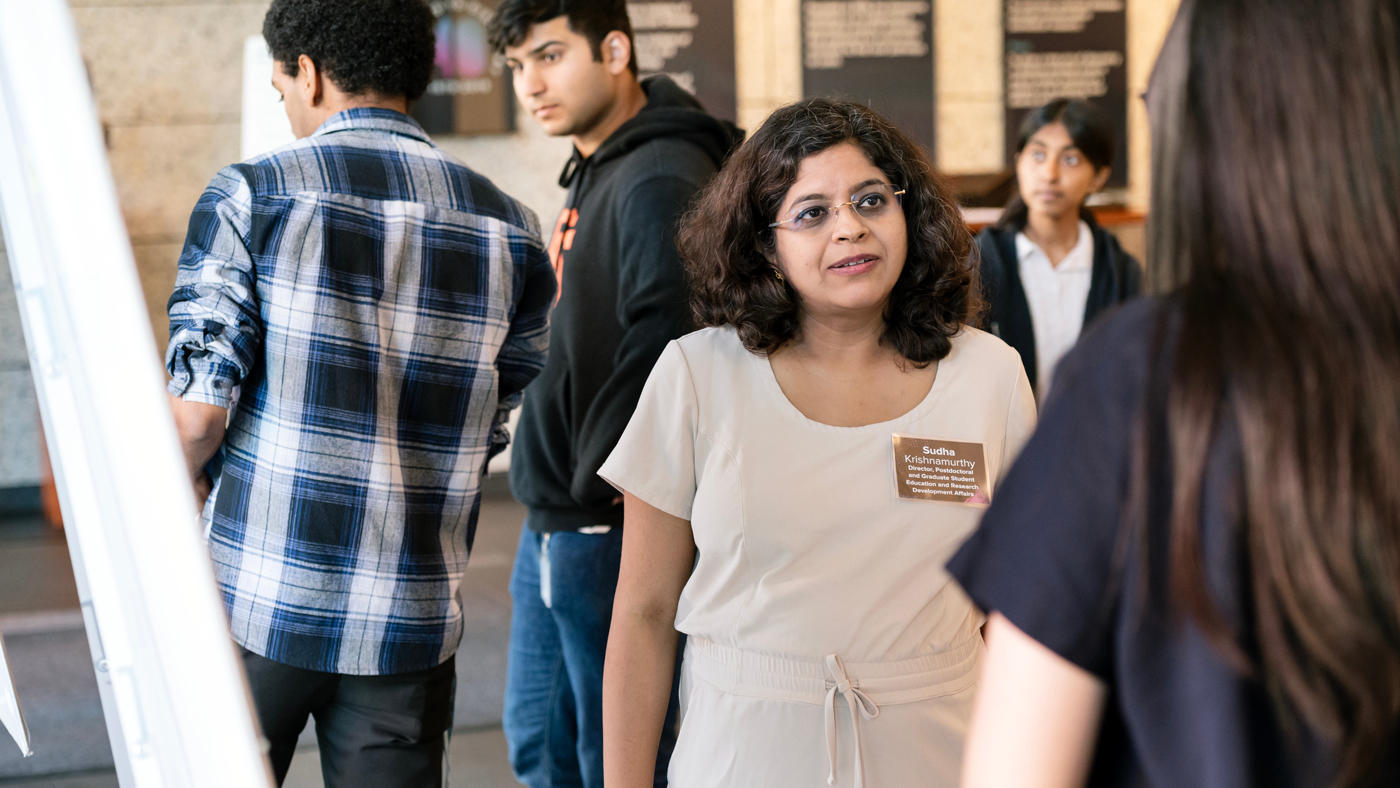
Sudha Krishnamurthy, PhD, listens to a PUMAS summer intern explain her research project.
During the first week of the program, the PUMAS interns are immersed in a scientific boot camp. They receive instruction on lab safety, learn pipetting basics, and discuss scientific concepts and techniques. They attend workshops on effective communication, preparing an academic résumé, and applying to graduate programs. Everything is novel. Richmond-Buccola even got to enter a biosafety lab to watch a researcher conduct an experiment. “This felt major league,” he says, “almost like being in a movie—suiting up head-to-toe, putting on double gloves, the works. While it was ‘fun’ for me at the time, this memory is extremely poignant now, given the recent COVID-19 pandemic and a refocus on dangerous pathogens.”
For his PUMAS project, Richmond-Buccola contributed to understanding how human immunodeficiency virus (HIV-1) establishes dormancy inside human cells upon primary infection. Along with the other PUMAS interns, he presented his findings at the end of the summer in a formal poster session attended by Gladstone’s scientific community. His mentor was at his side for encouragement as Gladstone PIs and institute leaders stopped by to discuss his research.
Ott, the program’s founder, who is also executive vice president at Gladstone and director of the Gladstone Institute of Virology, always takes time to meet the interns. “We’re connecting with them at a critical point in their academic careers, just when they’re preparing to enter a four-year institution,” she says. “In the months they’re with us, we give them concentrated training and practical laboratory participation—providing them with the knowledge, skills and confidence to pursue their ambitions. Our PUMAS interns go on to have very successful careers.”
"We're a small program but we have a big impact."
To date, Gladstone’s PUMAS program has helped propel more than 80 community college students toward advanced education and scientific careers.
“We’re a small program but we have a big impact,” says Krishnamurthy. “I think one of our strengths is that we personalize the experience for the interns, we check on them often during the summer, and keep in touch afterward. We still track interns who graduated years ago. Some alumni return to work in our labs, providing incoming students a ‘face that looks like me.’ One has joined a PUMAS advisory committee. As I said, we are contributing to diversity in science in a small but impactful way.”
A few years after his internship, Richmond-Buccola spoke at a Pantheon Awards ceremony hosted by the California Life Sciences Association. Gladstone had been recognized as a top Biotechnology Educator for its PUMAS program and Richmond-Buccola eloquently emphasized its value in his speech: “When we choose to lift up underrepresented students, we help transform them into role models for the next generation of scientists and thinkers. Gladstone shared with me this responsibility.”
As the PUMAS program enters its second decade, fueled by a five-year grant renewal that will support as many as 60 more interns through 2028, Krishnamurthy and her team are already scouting for the next cohort of summer interns. Undiscovered scientific talent resides just outside Gladstone’s doors and she and her team are ready to welcome motivated students inside and equip them for success.
One Person’s Final Gift to Science Gets Us Closer to an HIV Cure
One Person’s Final Gift to Science Gets Us Closer to an HIV Cure
A new documentary follows Jim Dunn’s end-of-life decision to donate his tissues to HIV research.
Institutional News HIV/AIDS Infectious Disease Roan LabBeyond Viruses: Expanding the Fight Against Infectious Diseases
Beyond Viruses: Expanding the Fight Against Infectious Diseases
The newly renamed Gladstone Infectious Disease Institute broadens its mission to address global health threats ranging from antibiotic resistance to infections that cause chronic diseases.
Institutional News News Release Cancer COVID-19 Hepatitis C HIV/AIDS Zika Virus Infectious DiseaseFueling Discovery at the Frontiers of Neuroscience: The NOMIS-Gladstone Fellowship Program
Fueling Discovery at the Frontiers of Neuroscience: The NOMIS-Gladstone Fellowship Program
The NOMIS-Gladstone Fellowship Program empowers early-career scientists to push the boundaries of neuroscience and unlock the brain’s deepest mysteries.
Institutional News Neurological Disease Mucke Lab NOMIS

